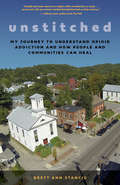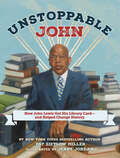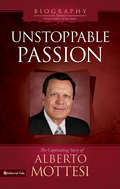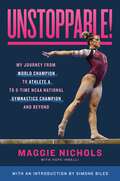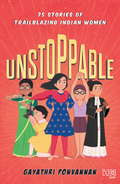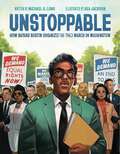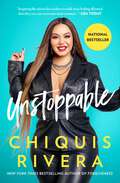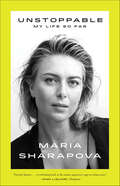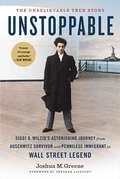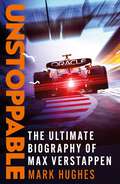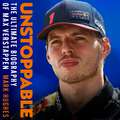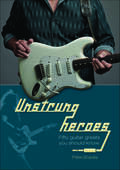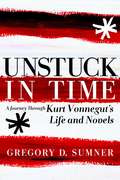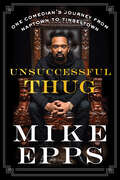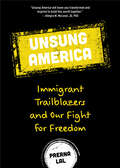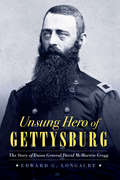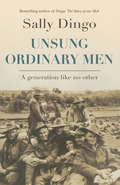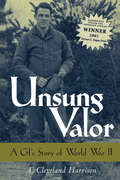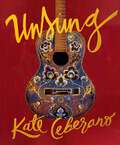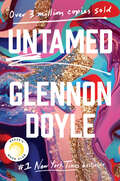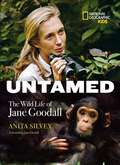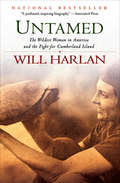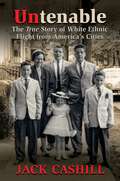- Table View
- List View
Unstitched: My Journey to Understand Opioid Addiction and How People and Communities Can Heal
by Brett Ann StanciuWhat if society looked at addiction without judgement? Unstitched shares the powerful story of one librarian&’s quest to understand the impact of addiction fed by stigma and inevitable secrecy.The opioid epidemic has hit people in communities large and small and across all socio-economic classes. What should each of us know about it, and do about it? Unstitched moves readers from feelings of helplessness and blame into empathy, ultimately helping friends, family, and community members separate the disease of addiction from the person underneath.A stranger, rumored to be a heroin addict, repeatedly breaks into the small-town library Brett Ann Stanciu runs. After she tries to get law enforcement to take meaningful action against him—elementary school children and young parents with babies frequent the place after all—he dies by suicide. When she realizes how little she knows about opioid misuse, she sets out on a mission, seeking insight from others, such as people in recovery, treatment providers, the town police chief, and Vermont's US attorney. Stanciu&’s journey leads to compassionate generosity, renewed faith, and ultimately a measure of personal redemption as she realizes she has a role to play in helping the people of her community stitch themselves back together.
Unstoppable
by Anthony RoblesThe powerful and inspiring story of an all-American wrestler who defied the odds Anthony Robles is a three-time all-American wrestler, the 2011 NCAA National Wrestling Champion, and a Nike-sponsored athlete. He was also born without his right leg. Doctors could not explain to his mother, Judy, what led to the birth defect, but at the age of five, the one-legged toddler scaled a fifty-foot pole unassisted. From that moment on, Judy knew without a doubt that her son would be unstoppable. When Anthony first began wrestling in high school, he was the smallest kid on the team and finished the year in last place. Yet Anthony’s family and coaches supported his decision to continue, and he completed his junior and senior years with a 96–0 record to become a two-time Arizona State champion. In college, Anthony had to prove all over again that he could excel. Despite hardships on and off the mat—including the temptation to quit school and get a job to help his family when they lost their home to foreclosure—Anthony focused his determination and became a champion once again. Since winning the national championship in March 2011, Anthony has become a nationally recognized role model to kids and adults alike. But Unstoppable is not just an exciting sports memoir or an inspirational tale of living with a disability. It is also the story of one man whose spirit and unyielding resolve remind us all that we have the power to conquer adversity—in whatever form. .
Unstoppable John: How John Lewis Got His Library Card--and Helped Change History
by Pat Zietlow MillerA poignant picture book biography on how John Lewis got his library card and helped change history.All John Lewis wanted was a library card, but in 1956, libraries were only for white people.That didn't seem fair to John, and so he spent a lifetime advocating for change and fighting against unfair laws until the laws changed. Finally, black people could eat at restaurants, see movies, vote in elections, and even get library cards. With an in-depth author's note, a timeline of John Lewis's life, and a lengthy list of resources, Unstoppable John, illustrated by Jerry Jordan and written by New York Times bestselling author Pat Zietlow Miller, explores the profound impact John had on the world and that books had on him.
Unstoppable Passion: The Captivating Story of Alberto Mottesi
by Alberto MottesiIn this book Dr. Alberto Mottesi demonstrates in a special way the generosity and mercy of God who sent his only Son as an immensely valuable instrument for touching lives and calling sinners to a person relationship with God. Pastor Mottesi lives a life that is filled with a passion for souls, and in this volume he teaches that the purpose of his life is to encourage the downtrodden. To inject passion into the youth. To provide a vision. To promote spiritual fire. To awaken consciences and to raise up a generation that will transform history. Only in this way, with this passion for the Word, can a child of God surrender himself entirely to preaching and proclaiming: “Because the word of God is living and active. Sharper that any two-edged sword…”
Unstoppable!: My Journey from World Champion to Athlete A to 8-Time NCAA National Gymnastics Champion and Beyond
by Maggie NicholsMaggie Nichols’s official memoir is an inspirational tell-all about the abuse she suffered under the US national gymnastics team and how she managed to redefine herself in the face of adversity.With an introduction from Simone Biles. In 2015, Maggie Nichols’s gymnastics career was on fire. Having spent most of her young life training as an elite-level gymnast, Maggie carried the team all-around at the 2015 World Championships, helping to cinch the team gold medal. Next in her sights was the Olympics in Rio de Janeiro. She was eagerly looking forward to training for the 2016 Olympic Games along with teammates such as Aly Raisman, Simone Biles, and Laurie Hernandez. But on the verge of achieving her lifelong Olympic dream, her world came crashing down. That summer Maggie revealed to her coach that USAG doctor Larry Nassar had been sexually abusing herself and other athletes under his care. What followed was an extensive investigation that would capture the nation’s attention and illuminate for the world the trauma and massive cover-up behind the scenes of one of the country’s most celebrated sports institutions. Ultimately, Maggie would go on to become an 8-time NCAA champion and an outspoken advocate for the protection of young children, especially young athletes. This inspirational tell-all offers an intimate look into the world of elite gymnastics, the sexual abuse scandal that shattered lives and dreams, and how Maggie Nichols risked everything in the name of justice. Maggie now tells this story in her words: a story of hope, trauma, reclamation, and above all, triumph.
Unstoppable: 75 Stories of Trailblazing Indian Women
by Gayathri PonvannanMeet the wonder women of Indian history! They flew planes, swam across oceans, led armies, performed stunts, built cities and captured historic moments on camera, despite being constantly told to stay home, because that?s what `good girls? did. These were women who dared to dream and worked hard to turn their dreams into reality, who shaped their own destinies and refused to let anyone tell them what to do. Featuring the amazing adventures of Janaki Ammal, Rani Abbakka, Nadia Wadia, Sarla Sharma Thakral, Rajkumari Amrit Kaur and many others, Unstoppable is a collection of 75 power-packed stories of the extraordinary Indian women who broke the rules to change the world around them for the better.
Unstoppable: How Bayard Rustin Organized the 1963 March on Washington
by Michael G. LongThis powerful and triumphant picture book biography tells the story of how openly gay civil rights leader Bayard Rustin defied prejudice as he planned and organized the historic March on Washington for Jobs and Freedom. <P><P> Bayard Rustin was a troublemaker. He spent his life disrupting racism and prejudice with nonviolent direct action. He organized protests against war, nuclear weapons, racial segregation and discrimination. He was a friend and mentor to Martin Luther King Jr., and he was unapologetically gay and Black. <P><P> When Bayard and his mentor, A. Philip Randolph, set out to organize the historic March on Washington for Jobs and Freedom, Bayard was targeted by those who wished to see the movement fail. But Bayard Rustin would not be stopped. With the support of Dr. King and future congressman John Lewis, Bayard organized the largest protest in civil rights history. <P><P> This stunning picture book ,written by Rustin scholar Michael G. Long and illustrated by the New York Times bestselling artist Bea Jackson, tells the incredible story of how Bayard Rustin led over 250,000 people to the doorstep of the United States government demanding change. <P><P><i>Advisory: Bookshare has learned that this book offers only partial accessibility. We have kept it in the collection because it is useful for some of our members. Benetech is actively working on projects to improve accessibility issues such as these.</i>
Unstoppable: How I Found My Strength Through Love and Loss
by Chiquis RiveraLatin Grammy Award–winning singer-songwriter and author of the New York Times bestseller Forgiveness returns with a new memoir that shares the triumphs, hardships, and lessons of life after her mother&’s, Jenni Rivera, death.Bringing her signature warmth, humor, and positivity to the page, Chiquis Rivera picks up where her memoir Forgiveness left off. Reeling from her mother&’s tragic death, Chiquis finds herself at a major crossroads. As a new parent to her younger brother and sister, she struggles to balance her family&’s needs with her dreams of becoming a successful singer and entrepreneur. Stepping out of the shadow of her mother&’s legendary career and finding her own identity as a singer is challenging…but navigating unhealthy relationships proves to be even harder. When she meets and marries the person she believes is the man of her dreams, it seems like life is finally falling into place. But a dark secret unravels their relationship, and Chiquis emerges stronger as a single woman. In the end, nothing can keep Chiquis down. Her life philosophy says it all: &“Either I thrive or I learn.&” Filled with life-affirming revelations, Chiquis ultimately shares her greatest gift with her fans—the accessible lessons that have made her unstoppable.
Unstoppable: My Life So Far
by Maria SharapovaFrom the five-time Grand Slam winner Maria Sharapova, the candid, captivating story of her rise to tennis stardom.*One of The Boston Globe's Best Books of 2017*In the middle of the night, a father and his daughter step off a Greyhound bus in Florida and head straight to the Nick Bollettieri Tennis Academy. They ring the bell, though no one is expecting them and they don’t speak English. The two have arrived from Russia with only seven hundred dollars and the conviction that this six-year-old will be the next tennis star. Amazingly, they are right.Young Maria Sharapova went on to win Wimbledon at just seventeen years old, in an astonishing upset against the reigning champion Serena Williams—the match that kicked off their legendary rivalry and placed Sharapova on the international stage. At eighteen, she reached the number one WTA ranking for the first time, and has held that ranking many times since. In this gripping autobiography, the five-time Grand Slam winner recounts the story of her phenomenal rise to success, narrated with the same no-holds-barred, fiercely provocative attitude that characterizes her tennis game.Full of thrilling, insightful episodes from her beginnings in Siberia, from career-defining games, and from her recent fight to get back on the court, Unstoppable is an inspiring tale of persistence, pulsing with fearlessness and candor. Sharapova’s is an utterly unforgettable story.
Unstoppable: Siggi B. Wilzig's Astonishing Journey from Auschwitz Survivor and Penniless Immigrant to Wall Street Legend
by Joshua M. GreeneWinner – Best of Los Angeles Award's "Best Holocaust Book - 2021" &“A must-read that hopefully will be adapted for the screen. Greene lets Wilzig&’s effervescent spirit shine through, and his story will appeal to a wide variety of readers.&” - Library JournalUnstoppable is the ultimate immigrant story and an epic David-and-Goliath adventure. While American teens were socializing in ice cream parlors, Siggi was suffering beatings by Nazi hoodlums for being a Jew and was soon deported along with his family to the darkest place the world has ever known: Auschwitz. Siggi used his wits to stay alive, pretending to have trade skills the Nazis could exploit to run the camp. After two death marches and near starvation, he was liberated from camp Mauthausen and went to work for the US Army hunting Nazis, a service that earned him a visa to America. On arrival, he made three vows: to never go hungry again, to support the Jewish people, and to speak out against injustice. He earned his first dollar shoveling snow after a fierce blizzard. His next job was laboring in toxic sweatshops. From these humble beginnings, he became President, Chairman and CEO of a New York Stock Exchange-listed oil company and grew a full-service commercial bank to more than $4 billion in assets. Siggi&’s ascent from the darkest of yesterdays to the brightest of tomorrows holds sway over the imagination in this riveting narrative of grit, cunning, luck, and the determination to live life to the fullest.
Unstoppable: The Ultimate Biography of Max Verstappen
by Mark HughesA definitive and intriguing biography of Max Verstappen, Formula 1's superstar, Lewis Hamilton's great rival and the winner of the 2021 and 2022 World Drivers' Championships.No Hollywood scriptwriter could possibly have envisioned the breathless, adrenaline-pumping climax to the 2021 Formula 1 season. On the very last lap of the final race of an unbelievably arduous and controversial season, Red Bull's Max Verstappen nervelessly overtook the seven-time World Champion Lewis Hamilton of Mercedes to clinch the first place that thrust the young prodigy to the narrowest of victories and to his first World Drivers' title. He followed up by taking the 2022 title as well.Verstappen may only be 25 years of age, but the Dutch motorsport sensation has an incredible record in F1. This young man has already left an indelible mark on the sport. The son of F1 driver Jos, Verstappen junior quickly stepped out of his father's shadow: his youthful charisma, ferocious speed, fearless driving style and refusal to back down mark him out as a true champion. And the phenomenal success of Netflix's Drive to Survive documentary series has elevated his worldwide popularity still further.Widely respected motorsport writer and F1 insider Mark Hughes is perfectly placed to write the most authoritative narrative on Verstappen's incredible rise through the ranks to F1 glory. Hughes' immaculate credentials and first-rate access enable him to generate fresh and fascinating insights, and to paint a fully-rounded and richly-textured portrait of one of the most exciting young sportsmen on the planet.
Unstoppable: The Ultimate Biography of Max Verstappen
by Mark HughesA definitive and intriguing biography of Max Verstappen, Formula 1's superstar, Lewis Hamilton's great rival and the winner of the 2021 and 2022 World Drivers' Championships.No Hollywood scriptwriter could possibly have envisioned the breathless, adrenaline-pumping climax to the 2021 Formula 1 season. On the very last lap of the final race of an unbelievably arduous and controversial season, Red Bull's Max Verstappen nervelessly overtook the seven-time World Champion Lewis Hamilton of Mercedes to clinch the first place that thrust the young prodigy to the narrowest of victories and to his first World Drivers' title. He followed up by taking the 2022 title as well.Verstappen may only be 25 years of age, but the Dutch motorsport sensation has an incredible record in F1. This young man has already left an indelible mark on the sport. The son of F1 driver Jos, Verstappen junior quickly stepped out of his father's shadow: his youthful charisma, ferocious speed, fearless driving style and refusal to back down mark him out as a true champion. And the phenomenal success of Netflix's Drive to Survive documentary series has elevated his worldwide popularity still further.Widely respected motorsport writer and F1 insider Mark Hughes is perfectly placed to write the most authoritative narrative on Verstappen's incredible rise through the ranks to F1 glory. Hughes' immaculate credentials and first-rate access enable him to generate fresh and fascinating insights, and to paint a fully-rounded and richly-textured portrait of one of the most exciting young sportsmen on the planet.
Unstoppable: The Ultimate Biography of Max Verstappen
by Mark HughesA definitive and intriguing biography of Max Verstappen, Formula 1's superstar, Lewis Hamilton's great rival and the winner of the 2021 and 2022 World Drivers' Championships.No Hollywood scriptwriter could possibly have envisioned the breathless, adrenaline-pumping climax to the 2021 Formula 1 season. On the very last lap of the final race of an unbelievably arduous and controversial season, Red Bull's Max Verstappen nervelessly overtook the seven-time World Champion Lewis Hamilton of Mercedes to clinch the first place that thrust the young prodigy to the narrowest of victories and to his first World Drivers' title. He followed up by taking the 2022 title as well.Verstappen may only be 25 years of age, but the Dutch motorsport sensation has an incredible record in F1: 170 race starts, 84 podium finishes and 40 Grand Prix victories barely tell the story - this young man has already left an indelible mark on the sport. The son of F1 driver Jos, Verstappen junior quickly stepped out of his father's shadow: his youthful charisma, ferocious speed, fearless driving style and refusal to back down mark him out as a true champion. And the phenomenal success of Netflix's Drive to Survive documentary series has elevated his worldwide popularity still further.Widely respected motorsport writer and F1 insider Mark Hughes is perfectly placed to write the most authoritative narrative on Verstappen's incredible rise through the ranks to F1 glory. Hughes' immaculate credentials and first-rate access enable him to generate fresh and fascinating insights, and to paint a fully-rounded and richly-textured portrait of one of the most exciting young sportsmen on the planet.(P)2023 Headline Publishing Group Ltd
Unstrung Heroes: Fifty Guitar Greats You Should Know
by Pete BraidisInterviews with 50 guitar players you've no doubt heard but may not know by nameGuitar players from pop to jazz to heavy metal and folk, from the 1960s to the present dayAn insider's look behind the scenes of some of the greatest music ever recorded
Unstuck in Time: A Journey Through Kurt Vonnegut's Life and Novels
by Gregory D. SumnerIn Unstuck in Time, Gregory Sumner guides us, with insight and passion, through a biography of fifteen of Kurt Vonnegut's best known works, his fourteen novels starting with Player Piano (1952) all the way to an epilogue on his last book, A Man Without a Country (2005), to illustrate the quintessential American writer's profound engagement with the "American Dream" in its various forms. Sumner gives us a poignant portrait of Vonnegut and his resistance to celebrating the traditional values associated with the American Dream: grandiose ambition, unbridled material success, rugged individualism, and "winners" over "losers." Instead of a celebration of these values, we read and share Vonnegut's outrage, his brokenhearted empathy for those who struggle under the ethos of survival-of-the-fittest in the frontier mentality--something he once memorably described as "an impossibly tough-minded experiment in loneliness." Heroic and tragic, Vonnegut's novels reflect the pain of his own life's experiences, relieved by small acts of kindness, friendship, and love that exemplify another way of living, another sort of human utopia, an alternative American Dream, and the reason we always return to his books.
Unsuccessful Thug: One Comedian's Journey from Naptown to Tinseltown
by Mike EppsFrom Naptown to Tinseltown—legendary stand-up comedian and actor Mike Epps finally tells all in this outrageous, hilarious, no-holds-barred memoir.Before starring in Def Comedy Jam and Showtime at the Apollo—before the sold-out comedy shows, Uncle Buck, and becoming his hero Richard Pryor in a biopic—there was Indianapolis. And not the good part. Mike Epps is one of America’s favorite and funniest people, but the path to fame was paved with opportunities to mess it up. And mess it up he did. Growing up in “Naptown”—what people who live there really call rough-around-the-edges Indianapolis—Epps found himself forced to hustle from an early age. Despite his mother’s best efforts, and the love of his well-behaved brother, “Chaney,” and his beloved sister, Julie, Epps was drawn to a life of crime, but as he quickly discovered, stealing and dealing didn’t really fit his sweet sensibilities. Not to mention he wasn’t very good at it—take, for example, the day he had to call the cops on himself when a dog wouldn’t let him leave a house he was burgling. After several arrests and more than a few months in jail, Epps finally realized that he was an unsuccessful thug, and instead turned to the next most obvious career path: stand-up comedy. Heading first to New York, then all over the country, and finally to Hollywood, Mike Epps carved out a unique place in American comedy, combining hysterical tales of his family and friends with a mordant take on life in the Naptowns of America. Comedy saved Mike Epps, and here he reveals exactly how he finally grew up and got out, barely. And when describing how he survived when so many of his friends didn’t, Epps makes clear what he’s thankful for and sorry about. Unsuccessful Thug is about growing up black in America, facing down racism in Hollywood, and ultimately how it feels to fail at thugdom, pull yourself up by the bootstraps, and end up selling out arenas and starring in movies across the country.
Unsung America: Immigrant Trailblazers and Our Fight for Freedom
by Prerna LalReal immigrant perspectives of America&’s immigration system, perfect for fans of The Book of Awesome Women, Dear America, or American Like Me. Positive and heroic stories. Far too often, immigrants are demonized and scapegoated, when they should be celebrated as heroes and revolutionaries. This book strings together both triumphant and painful tales of immigrants who blazed trails and broke barriers in the fight for fundamental human rights.Unsung Heroes. These are ordinary people who have used their own stories on the fight for citizenship to illustrate their triumphs and trials as immigrants in a new land. Each uses a different strategy and tactics; what works for one does not work for another. They all have one thing in common, however―a desire for racial and social justice.Unsung America will transform how you view immigrants and refugees. In this celebratory book, you will discover:· Powerful theories of social change, and how what seems radical in one era can be normalized in the next· How the fight for citizenship is interconnected and interrelated to other struggles such as the civil rights movement and the LGBTQ movement· Stories about ordinary people doing extraordinary things and how you, too, can be a force for good in the worldPraise for Unsung America &“Unsung America...pushes us to interrogate our violent immigration system and also uplifts the people whose contributions are too often erased.&”—Tina Vasquez, senior immigration reporter at Rewire News &“Lal lays out a timeline…that vividly chronicles the birth and impact of certain policies, views, and opinions within the realm of immigration policy.&”—Juan Escalante, Digital Campaigns Manager at FWD.us
Unsung Hero of Gettysburg: The Story of Union General David McMurtrie Gregg
by Edward G. LongacreGen. David McMurtrie Gregg (1833–1917) was one of the ablest and most successful commanders of cavalry in any Civil War army. Pennsylvania-born, West Point–educated, and deeply experienced in cavalry operations prior to the conflict, his career personified that of the typical cavalry officer in the mid-nineteenth-century American army. Gregg achieved distinction on many battlefields, including those during the Peninsula, Chancellorsville, Gettysburg, Bristoe, Overland, and Petersburg campaigns, ultimately gaining the rank of brevet major general as leader of the Second Division, Cavalry Corps, Army of the Potomac. The highlight of his service occurred on July 3, 1863, the climactic third day at Gettysburg, when he led his own command as well as the brigade of Brig. Gen. George Armstrong Custer in repulsing an attempt by thousands of Confederate cavalry under the legendary J. E. B. Stuart in attacking the right flank and rear of the Union Army while Pickett&’s charge struck its front and center. Historians credit Gregg with helping preserve the security of his army at a critical point, making Union victory inevitable. Unlike glory-hunters such as Custer and Stuart, Gregg was a quietly competent veteran who never promoted himself or sought personal recognition for his service. Rarely has a military commander of such distinction been denied a biographer&’s tribute. Gregg&’s time is long overdue.
Unsung Ordinary Men: A Generation Like No Other
by Sally DingoAfter spending over three years in the horrific prisoner-of-war camps, including those along the Thai-Burma Railway, Sally Dingo's father Max was one of the fortunate ones: he came home. And yet, like most of the 22,000 Australian POWs of the Japanese, he would not, or could not, talk about what happened with those closest to him. It is also the story of Max's father Mort, who had served in World War I, the story of Max's cobbers - the perhaps unique community of ex-POWs who kept each other going - and the story of the mothers, wives and children who tried to understand what their men were still going through, decades later. This is the story of men, unsung and ordinary, who defended their country and were reluctant to tell the tale.
Unsung Valor: A GI's Story of World War II
by A. Cleveland HarrisonWinner of the 2001 Forrest C. Pogue Prize from the Eisenhower Center for American StudiesWhen drafted into the army in 1943, A. Cleveland Harrison was a reluctant eighteen-year-old Arkansas student sure that he would not make a good soldier. But inside thirty months he manfully bore arms and more. This book is his memoir about becoming a soldier, a common infantryman among the ranks of those who truly won the war. After the Allied victory in 1945, books by and about the major statesmen, generals, and heroes of World War II appeared regularly. Yet millions of American soldiers who helped achieve and secure victory slipped silently into civilian life, trying to forget the war and what they had done. Most remain unsung, for virtually none thought of themselves as exceptional. During the war ordinary soldiers had only done what they believed their country expected. Harrison's firsthand account is the full history of what happened to him in three units from 1943 to 1946, disclosing the sensibilities, the conflicting emotions, and the humor that coalesced within the naive draftee. He details the induction and basic training procedures, his student experiences in Army pre-engineering school, his infantry training and overseas combat, battle wounds and the complete medical pipeline of hospitalization and recovery, the waits in replacement depots, life in the Army of Occupation, and his discharge. Wrenched from college and denied the Army Specialized Training Program's promise of individual choice in assignment, students were thrust into the infantry. Harrison's memoir describes training in the Ninety-fourth Infantry Division in the U.S., their first combat holding action at Lorient, France, and the division's race to join Patton's Third Army, where Harrison's company was decimated, and he was wounded while attacking the Siegfried Line. Reassigned to the U.S. Group Control Council, he had a unique opportunity to observe both the highest echelons in military government and the ordinary soldiers as Allied troops occupied Berlin. This veteran's memoir reveals all aspects of military life and sings of those valorous but ordinary soldiers who achieved the victory.
Unsung: A Compendium of Creativity
by Kate CeberanoA beautiful illustrated memoir from beloved Australian musician Kate Ceberano, featuring her inspirational song lyrics, stories, paintings and embroidery, and celebrating four decades of songwriting and recording on the release of her 30th album. Kate Ceberano is used to a hush descending as she draws breath to release that magnificent voice but when the whole world quietened in 2020, she found the silence disorientating. Without an audience or long hours of travel with her tribe of musicians, there was time to think. But what does an artist do when they can&’t make art? They find a way. With characteristic passion, abundance and joy, Kate liberated her unsung songs. They flowed through her paintbrush as she embellished guitars, her needle as she stitched quilts to envelop her beloveds and her pen as she unfurled stories, poems and songs. In Unsung Kate muses on the people and experiences that have inspired her, on what has humbled her, what hurts and what sustains. This is the story of a powerful woman in her prime, but also of a reflective, romantic and vulnerable artist making sense of the universe. It&’s proof of a lifetime lived in music. It&’s a tribute to songs, wherever they come from and wherever they go.
Untamed: The Journal (how To Quit Pleasing And Start Living)
by Glennon DoyleIn her most revealing and powerful memoir yet, the beloved activist, speaker, and bestselling author of Love Warrior and Carry On, Warrior explores the joy and peace we discover when we stop striving to meet the expectations of the world, and start trusting the voice deep within us. <P><P> This is how you find yourself.There is a voice of longing inside each woman. We strive so mightily to be good: good partners, daughters, mothers, employees, and friends. We hope all this striving will make us feel alive. Instead, it leaves us feeling weary, stuck, overwhelmed, and underwhelmed. We look at our lives and wonder: Wasn’t it all supposed to be more beautiful than this? <P><P>We quickly silence that question, telling ourselves to be grateful, hiding our discontent—even from ourselves. For many years, Glennon Doyle denied her own discontent. Then, while speaking at a conference, she looked at a woman across the room and fell instantly in love. Three words flooded her mind: There She Is. <P><P> At first, Glennon assumed these words came to her from on high. But she soon realized they had come to her from within. This was her own voice—the one she had buried beneath decades of numbing addictions, cultural conditioning, and institutional allegiances. This was the voice of the girl she had been before the world told her who to be. Glennon decided to quit abandoning herself and to instead abandon the world’s expectations of her. She quit being good so she could be free. She quit pleasing and started living. <P><P>Soulful and uproarious, forceful and tender, Untamed is both an intimate memoir and a galvanizing wake-up call. It is the story of how one woman learned that a responsible mother is not one who slowly dies for her children, but one who shows them how to fully live. It is the story of navigating divorce, forming a new blended family, and discovering that the brokenness or wholeness of a family depends not on its structure but on each member’s ability to bring her full self to the table. <P><P>And it is the story of how each of us can begin to trust ourselves enough to set boundaries, make peace with our bodies, honor our anger and heartbreak, and unleash our truest, wildest instincts so that we become women who can finally look at ourselves and say: There She Is. Untamed shows us how to be brave. As Glennon insists: The braver we are, the luckier we get. <P><P><b>A New York Times Bestseller</b>
Untamed: The Wild Life of Jane Goodall
by Anita SilveyJane Goodall, one of the most recognized scientists in the Western world, became internationally famous because of her ability to observe and connect with another species. A girl of humble beginnings and training, she made scientific breakthroughs thought impossible by more experienced field observers when she was only in her twenties. Then these animals shaped Jane's life. She began tirelessly fighting to protect the environment so that chimpanzees and other animals will continue have a place and a future on our planet. Jane Goodall continues to leave the modern world with an extraordinary legacy and has changed the scientific community forever.
Untamed: The Wildest Woman in America and the Fight for Cumberland Island
by Will HarlanCarol Ruckdeschel is the wildest woman in America. She wrestles alligators, eats roadkill, rides horses bareback, and lives in a ramshackle cabin that she built by hand in an island wilderness. A combination of Henry David Thoreau and Jane Goodall, Carol is a self-taught scientist who has become a tireless defender of sea turtles on Cumberland Island, a national park off the coast of Georgia.Cumberland, the country’s largest and most biologically diverse barrier island, is celebrated for its windswept dunes and feral horses. Steel magnate Thomas Carnegie once owned much of the island, and in recent years, Carnegie heirs and the National Park Service have clashed with Carol over the island’s future. What happens when a dirt-poor naturalist with only a high school diploma becomes an outspoken advocate on a celebrated but divisive island? Untamed is the story of an American original standing her ground and fighting for what she believes in, no matter the cost.
Untenable: The True Story of White Ethnic Flight from America's Cities
by Jack CashillLong accused of racism and &“white flight,&” the ethnic Americans driven from their homes and neighborhoods—the author included—finally get the chance to tell their side of the story.&“A startlingly honest and poignant look at &‘white flight&’ from the white perspective. A necessary and overdue corrective.&” —Brent Bozell III, founder and president of the Media Research Center I asked one lifelong friend, a rare Democrat among the displaced, why he and his widowed mother finally left our block in the early 1970s, twenty years after the first African-American families moved in. He searched a minute for the right set of words, and then simply said, &“It became untenable.&” When I asked what he meant by &“untenable,&” he answered, &“When your mother gets mugged for the second time, that&’s untenable. When your home gets broken into for the second time, that&’s untenable.&” In researching this project, I found myself repeatedly stunned by the failure of self-described experts on white flight to ask those accused of fleeing why it was they fled. The reason the experts didn&’t ask, I discovered, is that they were afraid of what they might learn.
